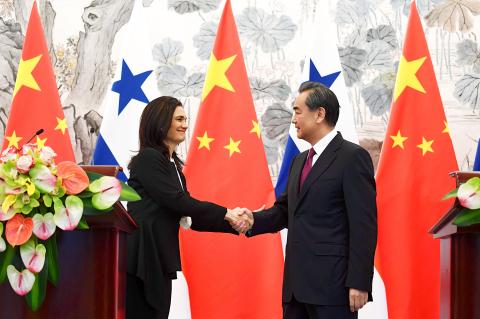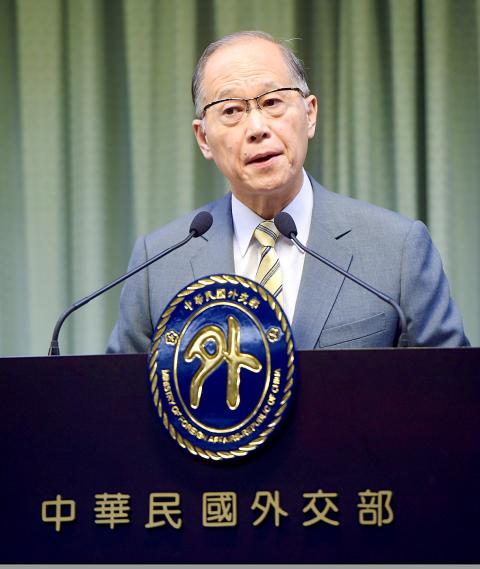Taiwan is cutting diplomatic ties with Panama after the Central American country switched diplomatic recognition from Taipei to Beijing, Minister of Foreign Affairs David Lee (李大維) announced yesterday.
“To safeguard our nation’s sovereignty and dignity, we have decided to terminate diplomatic ties with Panama immediately,” Lee said at a news conference, in which he also expressed Taiwan’s “deep anger and regret” about Panama’s decision.
Taiwan is also to halt all bilateral cooperative projects, cut all assistance to Panama, and pull out its diplomatic staff and technical missions from the country, Lee said.

Photo: AFP
Even though the two nations had maintained diplomatic ties for more than a century, Panamanian President Juan Carlos Varela caved in to Beijing for “economic interests” and ignored Taiwan’s long-term assistance that supported its overall development, Lee said.
Lee described Panama’s diplomatic switch as “most unfriendly” and accused Panama of “deceiving the Republic of China government until the last moment.”
He said that Taipei felt a sense of “strong dissatisfaction and anger” about the move, but reaffirmed that Taipei would not engage in a contest of “checkbook diplomacy” with Beijing.

Photo: Huang Yao-cheng, Taipei Times
Taiwan also “strongly protests and condemns Beijing for luring Panama to switch diplomatic ties, squeezing Taiwan’s space in the international community and hurting Taiwanese feelings,” he said.
Taiwan’s response came after Varela announced that Panama was establishing diplomatic ties with China, saying in a televised address that it represents the “correct path for our country.”
At the Diaoyutai State Guesthouse in Beijing yesterday, Chinese Minister of Foreign Affairs Wang Yi (王毅) and Panamanian Minister of Foreign Affairs Isabel de Saint Malo signed a joint communique establishing diplomatic relations, followed by a champagne toast.
Wang said he was sure relations between the two countries would have a “bright future.”
De Saint Malo said she hoped the new relationship would lead to trade, investment and tourism opportunities, in particular “exporting more goods from Panama to China.”
In the joint communique, Panama said it would not maintain any official ties with Taiwan and also agreed to recognize that there is only “one China” and that Taiwan is part of it.
Panama’s decision leaves Taiwan with 20 diplomatic allies, 11 of which are in Latin America and the Caribbean.
The decision is widely seen as a result of China’s mounting efforts to apply pressure on Taiwan since President Tsai Ing-wen (蔡英文) took office on May 20 last year.
Lee criticized Panama for keeping Taiwan in the dark about the move, but said there had been signs of Panama’s intentions and Taiwan used every means at its disposal to keep the Central American nation from moving in that direction, without going into specific details.
One of the signs was that Panama did not announce a successor after then-Panamanian ambassador to Taiwan Alfredo Martiz Fuentes on April 30 left his post to take over as Panama’s social security chief, even though Martiz told Tsai on April 20 that bilateral relations were solid.
In addition, Ambassador to Panama Miguel Tsao (曹立傑) has not been able to present his credentials since arriving in the country in the middle of last month.
The diplomatic rift came nearly one year after Tsai visited Panama in June last year on her first state visit.
Tsai attended the inaugural ceremony of the expanded Panama Canal and witnessed Taiwan’s donation of 3,000 boxes of flu medicine to help combat an epidemic of the H1N1 flu virus.
Ties between the Republic of China (ROC) and Panama date back more than a century, to when China's Qing Dynasty established diplomatic relations with Panama on Jan. 16, 1910. The ROC continued the relationship after its founding in January 1912.
Panama is the second diplomatic ally to cut ties since Tsai took office, the first being Sao Tome and Principe, which recognized Beijing in December last year.
In March last year, China re-established official ties with the Gambia, more than two years after the small African nation cut off relations with Taiwan.
Panama has actively sought to set up ties with China in the past.
According to a US Department of State diplomatic message released by WikiLeaks, Panama tried to establish relations with Beijing in 2009 without success.
Additional reporting by AP
This story has been amended since it was first published to correct the date of the establishment of diplomatic relations with Panama.

SECURITY: As China is ‘reshaping’ Hong Kong’s population, Taiwan must raise the eligibility threshold for applications from Hong Kongers, Chiu Chui-cheng said When Hong Kong and Macau citizens apply for residency in Taiwan, it would be under a new category that includes a “national security observation period,” Mainland Affairs Council (MAC) Minister Chiu Chui-cheng (邱垂正) said yesterday. President William Lai (賴清德) on March 13 announced 17 strategies to counter China’s aggression toward Taiwan, including incorporating national security considerations into the review process for residency applications from Hong Kong and Macau citizens. The situation in Hong Kong is constantly changing, Chiu said to media yesterday on the sidelines of the Taipei Technology Run hosted by the Taipei Neihu Technology Park Development Association. With

‘FORM OF PROTEST’: The German Institute Taipei said it was ‘shocked’ to see Nazi symbolism used in connection with political aims as it condemned the incident Sung Chien-liang (宋建樑), who led efforts to recall Democratic Progressive Party (DPP) Legislator Lee Kun-cheng (李坤城), was released on bail of NT$80,000 yesterday amid an outcry over a Nazi armband he wore to questioning the night before. Sung arrived at the New Taipei City District Prosecutors’ Office for questioning in a recall petition forgery case on Tuesday night wearing a red armband bearing a swastika, carrying a copy of Adolf Hitler’s Mein Kampf and giving a Nazi salute. Sung left the building at 1:15am without the armband and apparently covering the book with a coat. This is a serious international scandal and Chinese

A US Marine Corps regiment equipped with Naval Strike Missiles (NSM) is set to participate in the upcoming Balikatan 25 exercise in the Luzon Strait, marking the system’s first-ever deployment in the Philippines. US and Philippine officials have separately confirmed that the Navy Marine Expeditionary Ship Interdiction System (NMESIS) — the mobile launch platform for the Naval Strike Missile — would take part in the joint exercise. The missiles are being deployed to “a strategic first island chain chokepoint” in the waters between Taiwan proper and the Philippines, US-based Naval News reported. “The Luzon Strait and Bashi Channel represent a critical access

COUNTERINTELLIGENCE TRAINING: The ministry said 87.5 percent of the apprehended Chinese agents were reported by service members they tried to lure into becoming spies Taiwanese organized crime, illegal money lenders, temples and civic groups are complicit in Beijing’s infiltration of the armed forces, the Ministry of National Defense (MND) said in a report yesterday. Retired service members who had been turned to Beijing’s cause mainly relied on those channels to infiltrate the Taiwanese military, according to the report to be submitted to lawmakers ahead of tomorrow’s hearing on Chinese espionage in the military. Chinese intelligence typically used blackmail, Internet-based communications, bribery or debts to loan sharks to leverage active service personnel to do its bidding, it said. China’s main goals are to collect intelligence, and develop a